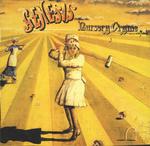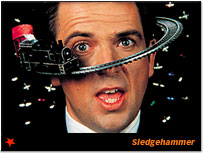October 11, 2003
SELLING ENGLISHNESS FOR THE DOLLAR
 |  |  |
Well, we agree on one thing. Gabriel's 'Sledgehammer' was the end of something. But of what, precisely?
Is there a record more emblematic of the Eighties - the post 82 80s, the post postpunk 80s - than that ? The bright and breezy, brassy, stodgy Eighties 'Soul' sound - horribly like Go West - that awful, played-every-five-minutes, conspicuously Expensive video.... It's like being trapped in a shopping mall on Saturday afternoon. Forever.
In an interesting post on House at World's End , Robin Carmody develops Simon's argument, pointing out that " 'Sledgehammer' and 'Invisible Touch' were consecutive US No1's around the time of Andrew and Fergie's wedding." By then, Robin avers, it became evident that High Tory Englishness was no protection against US capitalism.
Mention of 'Invisible Touch' can't help but bring to mind Patrick Bateman in American Psycho. In perhaps the most hilarious scene in the movie, Bateman - US consumer-capitalism personified - perfectly ventriloquizes the Eighties' revisionist take on Genesis' career:
'I've been a big Genesis fan ever since the release of their 1980 album, Duke. Before that, I really didn't understand any of their work. Too artsy, too intellectual. It was on Duke where, uh, Phil Collins' presence became more apparent. I think Invisible Touch was the group's undisputed masterpiece. It's an epic meditation on intangibility. At the same time, it deepens and enriches the meaning of the preceding three albums... Listen to the brilliant ensemble playing of Banks, Collins and Rutherford. You can practically hear every nuance of every instrument. ... The peak of professionalism. ... Take the lyrics to Land of Confusion. In this song, Phil Collins addresses the problems of abusive political authority. In Too Deep is the most moving pop song of the 1980s, about monogamy and commitment. The song is extremely uplifting. Their lyrics are as positive and affirmative as, uh, anything I've heard in rock. ... Phil Collins' solo career seems to be more commercial and therefore more satisfying, in a narrower way. Especially songs like In the Air Tonight and, uh, Against All Odds. ... But I also think Phil Collins works best within the confines of the group, than as a solo artist, and I stress the word artist. This is Sussudio, a great, great song, a personal favorite.'
(But, like Gabriel's 'Melt' album, [the one which includes 'Games Without Frontiers' etc.], wasn't 'In the Air Tonight' Collins' take on Neuwave?)
Certainly, what fascinates about the early Genesis is the quaint Olde Worlde Englishness of their record covers. Take the Nursery Cryme sleeve (see above), with its sinister Lewis Caroll croquet lawn and suggestion of a Faery-tale Albion of pantomime-gone-bad Punch and Judy menace. I'm not sure I've heard this one, to be honest, but the Gabriel-era Genesis I have heard falls disappointingly short of the English Can-plus-Spirit of Eden-plus Edward Lear plus medieval carnival perverse pastoral epic I idly imagined. Gabriel's vision and voice - then that quasi-hysterical anglo-quaver - were the saving graces but really the band are so poor, so lacking in imagination and deftness, that the end result is not the nobly deluded, elephantine absurdity one always associates with Prog, but a plodding, workmanlike competence. Like most Prog I've heard, Genesis' problem is not self-indulgent excess; it's dullness. Listening to the two Gabriel Genesis tapes I have (borrowed long ago from my Prog correspondent, Bruce), what strikes me about their music is its lack of nuance. It is either Quiet or Loud - no middle ground, no eddying flow or ebbing undercurrents, just a stuttering study in jerky contrast. Isn't that jabbing masculine jerkiness, that anti-plateau jumpiness, what is so much of a turn-off about Prog? Genesis' sound was English by default - still Blues/ r and r-based, it was English only in the sense that it was a specifically English take on American forms, not in the sense that it evoked England.
What I've heard of Gabriel's solo stuff is much more intriguingly English than Genesis. I've always found 'Solsbury Hill', for instance, movingly evocative of the rural English experience: the sharpness of clear air, that hollow, mossy feeling of earth beneath the feet, the town lights scattered below. In any case, if Gabriel-era Genesis were a failed attempt to produce a convincingly English rock sound, Collins-era Genesis and post-'Sledgehammer' Gabriel were an achieved attempt at simulating - and indeed outdoing - US AOR. Robin is right; by then, there is not a trace of English public school resistance to American hegemony. They are part of the programme.
But what is it that 'Sledgehammer' ends? I'll come back to that.
Interesting -- I do believe it was that gulf between the covers and the music that kept me from giving in to Genesis in the early 70s. A music that matched Nursery Crymes' cover would have won me over in my early teens but what I heard was the same traduced rock sludge you mention. For some truly evocative essentially English "prog" try the first Hatfield and the North album which I've just blogged about, but there must be more. There were a whole bunch of progsters that went for a arcane sackbutt and woodcut feel (in their names and LP sleeves at least) like Gentle Giant, Greenslade and Gryphon but I've never risked investigating these.
Posted by: Nigel at October 11, 2003 05:55 PM'Solsbury Hill' evocative of rural England? It's Gabriel bitching about his former band members and the fact that they didn't get a new singer, but let Phil Collins have the job!
I think that some Genesis does achieve the atmosphere of the 'Nursery Crymes' cover, but that it is a mood they are unable to sustain. Still, it's not all bad until you get to 'And Then There Were Three'.
If you really want to hear a band which sounds quintessentially English and downright perverse, check out Cardiacs: They sound like Genesis meets Zappa in a punk club on bad acid. Ask Bruce, he'll tell you!
Posted by: John at October 12, 2003 07:41 PM'Solsbury Hill' evocative of rural England? It's Gabriel bitching about his former band members and the fact that they didn't get a new singer, but let Phil Collins have the job!
Ah, the grim dampener of prosaic biographism!
Told you I didn't know anything about this stuff...
It's the music and the vocals for me that evoke the rural English experience rather than they lyrics (which, in common with most of PG's lyrics I find cryptically illegible). I suppose I was led astray byt the opening few lines. 'Climbing up on Solsbury Hill/ I could see the city light/ Wind was blowing, time stood still...' No doubt it all has a complex allegorical meaning beyond my powers of intertrepation (or stamina).
While we're on this. I don't suppose you could explain 'Games without Frontiers' could you?
Posted by: mark k-punk at October 12, 2003 09:12 PM'While we're on this. I don't suppose you could explain 'Games without Frontiers' could you?'
Oh no, one comment and I get cast in the role of Peter Gabriel expert!
It really is as prosaic as it seems with Gabriel equating European history to the international version of 'It's a Knockout' (Jeux sans frontieres) and, ermm, that's it really.
Posted by: John at October 12, 2003 09:33 PMI'm just teasing ya....
Mmmm, that international relations as It's A Knockout thing --- I've never really understood the conceit ---
And what's it all got to do with 'kissing baboons in the jungle'? Maybe that was one of the games, was it? My memory of Jeux sans Frontieres is somewhat hazy, but I don't remember any baboon-kissng games.
Posted by: mark k-punk at October 12, 2003 10:54 PMThe reference was a sideways "ironic" swipe at apartheid which PG balanced out with nine minutes plus of "Biko" at album's close. Also I'm pretty sure that "GWF" was the first hit single to feature the Fairlight sampler (Bush's "Army Dreamers" came a couple of months later).
Perhaps most ironic of all is that the precise point where PG goes global is in "PG2" and his contributions to Fripp's "Exposure" (the two albums were originally intended as part of a trilogy, but the delayed release of the third part, Daryl Hall's "Sacred Songs," put paid to that) - all produced by Fripp and mostly recorded in NY. "Here Comes The Flood"?
Personally I find his most aesthetically rewarding stuff the "Passion" Last Temptation soundtrack music, where he absents himself from the centre of the music (or at least doesn't sing) even though I'm fully aware that this could represent the apex of Wire Magazine-style benign musical globalisation (Laswell, N'Dour, Byrne etc. - all present on the "So" album, all meticulously blanded out and made to cancel each other out).
Posted by: Marcello Carlin at October 13, 2003 10:51 AM